Manchester Regiment Archives on the Boer War
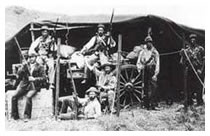 The Manchester Regiment archives contain an excellent collection of photographs, letters, diaries and ephemera relating to the Boer War. This was the first mass media war and there were comprehensive accounts in both national and local newspapers. However, photography had also developed to allow portable cameras in the field, showing the daily life of soldiers as never before.
The Manchester Regiment archives contain an excellent collection of photographs, letters, diaries and ephemera relating to the Boer War. This was the first mass media war and there were comprehensive accounts in both national and local newspapers. However, photography had also developed to allow portable cameras in the field, showing the daily life of soldiers as never before.
The collection reflects these developments, and has good personal accounts describing the conditions the soldiers served in. This exhibition contains a selection of these items to give an example of the kind of material in the collection and highlight the quality. Anyone who wishes to use the collection is very welcome to visit the Tameside Local Studies and Archives Centre.
Outbreak of War
The Boer War, according to Rudyard Kipling, taught the British "no end of a lesson". Thomas Pakenham, author of The Boer War has called it the longest, costliest, bloodiest and most humiliating war for Britain between 1815 and 1914.
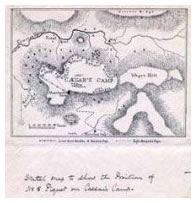 The crisis in South Africa which caused the war was the culmination of 250 years of expansion and conflict between the Boers and British settlers. The original colony was founded in 1652 at the Cape of Good Hope by the Dutch East India Company. Settlers were mainly Dutch Calvinists who brought with them a tradition of dissent and resentment against Europe, and farmers soon began to move deeper into African territory in search of good land. In 1806 Britain took control of the colony, and when slavery was abolished in 1834 the Great Trek began. 5,000 Boers (and their slaves) crossed the Orange and Vaal rivers to establish the Transvaal and Orange Free States where blacks and coloureds were denied political rights, while Cape Colony and Natal remained British.
The crisis in South Africa which caused the war was the culmination of 250 years of expansion and conflict between the Boers and British settlers. The original colony was founded in 1652 at the Cape of Good Hope by the Dutch East India Company. Settlers were mainly Dutch Calvinists who brought with them a tradition of dissent and resentment against Europe, and farmers soon began to move deeper into African territory in search of good land. In 1806 Britain took control of the colony, and when slavery was abolished in 1834 the Great Trek began. 5,000 Boers (and their slaves) crossed the Orange and Vaal rivers to establish the Transvaal and Orange Free States where blacks and coloureds were denied political rights, while Cape Colony and Natal remained British.
Tension between the British and Boers continued to grow. In 1877 Britain annexed the Transvaal, but this was reversed in 1881 by a rebellion led by Paul Kruger, President of the Transvaal (the first Boer War). However, the discovery of diamonds at Kimberley in 1870 and gold in the Transvaal in 1886 upset the existing balance of power. It made Cecil Rhodes and Alfred Beit into millionaires who wanted to take over the Transvaal, led to the foundation of a new colony - Rhodesia - and a rush of British settlers into Boer territory. The Boers denied political rights to the new immigrants or Uitlanders, and continuing skirmishes backed by Rhodes and Beit's money escalated until Transvaal declared war on Britain on October 9, 1899 followed by the Orange Free State on 11th October.
Caesar's Camp
The 1st Battalion of the Manchester Regiment were based at Caesar's Camp, just outside the town, and played an important role in repelling Boer attacks.
Psychological Effects of the Siege
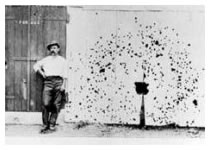 The Boers did not conform to the usual "gentlemanly" rules of war. Constant shelling meant that the men could not move openly during the day and had to camp in insanitary dugouts rather than in the open, which accelerated the spread of disease. This also curtailed recreational activities such as playing cricket and polo, which created an insidious air of boredom throughout the camp.
The Boers did not conform to the usual "gentlemanly" rules of war. Constant shelling meant that the men could not move openly during the day and had to camp in insanitary dugouts rather than in the open, which accelerated the spread of disease. This also curtailed recreational activities such as playing cricket and polo, which created an insidious air of boredom throughout the camp.
Fighting a war of attrition also deeply affected morale. This was a new experience for the British which deeply humiliated them, especially as they outnumbered the Boers 2-1. The men tried to improve morale by producing siege newspapers such as the "Ladysmith Lyre".
Conditions in Ladysmith
While the garrison waited for General Buller to break through Boer lines, conditions grew worse. General White had initially believed that they could still fight their way out and therefore did not treat the situation as a siege, despite the lack of food. It was not until Buller was defeated at Spion Kop in January that White agree to reduce rations, give horses' meal to the men and slaughter the horses for food.
In addition, the Principal Medical Officer Colonel Exham deliberately cut off all medical comforts to Intombi Hospital and diverted them to his cronies and other officers. The conditions in the hospitals were generally poor, the rate of death from disease was 10 to 20 per day - Ladysmith had a high rate of typhoid even before the siege. This, plus the difficulty in getting news from outside Ladysmith, had a devastating effect on the men's morale.
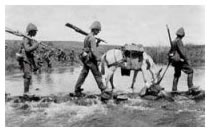 Conditions on the Veldt
Conditions on the Veldt
It had become clear to the British that they needed to adopt new tactics to defeat the Boers. They realised they needed to fight a series of battles over a long period of time covering wide areas of ground. This involved marching in long columns for days at a time across the vast plains or "veldt", often without proper uniforms or rations. The weather also caused problems, with freezing temperatures and storms in the winter and very hot summers.
Homeward Bound
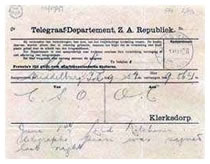 Peace was declared on 31st May, 1902.
Peace was declared on 31st May, 1902.
The 1st Battalion had suffered the highest casualties, reflecting their involvement in the fighting at Ladysmith. 4 officers and 75 NCOs and men were killed, 1 officer and 93 men died of disease and 145 were wounded. 70 serving with the 2nd Battalion died of wounds or disease, 22 with the 5th Battalion and 8 with the 6th Battalion.
All men who served received at South Africa medal. In addition to Privates Pitts' and Scott's V.C.s, a total of 13 Distinguished Service Orders and 26 Distinguished Conduct Medals were awarded to men of the Manchester Regiment.

